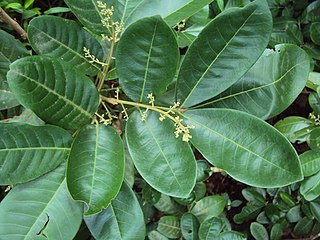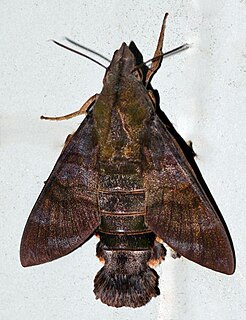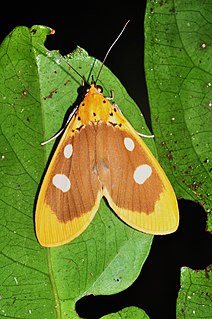
Borneo is the third-largest island in the world and the largest in Asia. At the geographic centre of Maritime Southeast Asia, in relation to major Indonesian islands, it is located north of Java, west of Sulawesi, and east of Sumatra.

The Indomalayan realm is one of the eight biogeographic realms. It extends across most of South and Southeast Asia and into the southern parts of East Asia.

Aglaia is a genus of 117 species of woody trees belonging to the Mahogany family (Meliaceae). These trees occur in the subtropical and tropical forests of Southeast Asia, Northern Australia and the Pacific.

Myrmarachne is a genus of ant-mimicking jumping spiders that was first described by W. S. MacLeay in 1839. They are commonly called antmimicking spiders, but they are not the only spiders that have this attribute. The name is a combination of Ancient Greek μύρμηξ (myrmex), meaning "ant", and ἀράχνη (arachne), meaning "spider".

Theretra silhetensis, the brown-banded hunter hawkmoth, is a moth of the family Sphingidae described by Francis Walker in 1856. It lives in Indo-Australia, India, Sri Lanka, Papua New Guinea, East Australia, Solomon Islands, Fiji Islands, Vanuatu Islands.

Macroglossum corythus is a species of hawk moth of the family Sphingidae. It was described by Francis Walker in 1856 and is found throughout the Indo-Australian tropics east to New Caledonia.

Asota is a genus of moths in the family Erebidae first described by Jacob Hübner in 1819. Species are widely distributed throughout Africa, India, Sri Lanka, Myanmar, the Malayan region and tropical parts of the Australian region.

Nyctemera adversata, the marbled white moth, is a moth of the family Erebidae first described by Johann Gottlieb Schaller in 1788. It is found in Sri Lanka, Bangladesh, India, Nepal, Myanmar, China territories like Tibet, Sichuan, Yunnan, Guangdong, Hong Kong, Hainan, Guangxi, Hunan, Henan, Zhejiang, Jiangxi, Fujian, Taiwan, Japan, Peninsular Malaysia, Thailand, Indonesia Philippines.

Peridrome orbicularis is a species of moth in the family Erebidae. The species is found in Bangladesh (Silhet), Cambodia, India, Indonesia, Laos, Malaysia (Pinang), Myanmar, the Philippines, Thailand and Vietnam.

Asota caricae, the tropical tiger moth, is a species of noctuoid moth in the family Erebidae. It is found from the Indo-Australian tropics of India and Sri Lanka to Queensland and Vanuatu.

Asota producta is a species of noctuoid moth in the family Erebidae. It is found from Sri Lanka and India to Sundaland.

Asota heliconia is a moth in the family Erebidae. It is found from the Indo-Australian tropics east to Queensland and the Solomons.

Asota plana is a moth in the family Erebidae first described by Francis Walker in 1854. It is found from the Oriental tropics east to New Guinea.

Asota javana is a moth of the family Erebidae first described by Pieter Cramer in 1780. It is found in Sundaland, the Philippines, Sulawesi and on Sula Island.
Asota paphos is a moth of the family Erebidae first described by Johan Christian Fabricius in 1787. It is found from the north-eastern Himalayas to Sundaland.
Asota albiformis is a moth of the family Erebidae first described by Charles Swinhoe in 1892. It is found in Borneo, the Philippines, Sulawesi and the Moluccas.

Asota plaginota is a moth of the family Erebidae first described by Arthur Gardiner Butler in 1875. It is found in China, India, Indonesia, Myanmar, Malaysia, Nepal, Papua New Guinea, the Philippines, Sikkim, Singapore, Sri Lanka, Thailand and Vietnam.
Asota orbona is a moth of the family Erebidae first described by Samuel Constantinus Snellen van Vollenhoven in 1863. It is found in Indonesia, Papua New Guinea and Queensland.

Argina astrea, the crotalaria podborer, is a moth of the family Erebidae. The species was first described by Dru Drury in 1773. It is found in eastern Africa, southern Asia of India, Sri Lanka, and Indo-Australia, including the Pacific Islands and Australia.
















